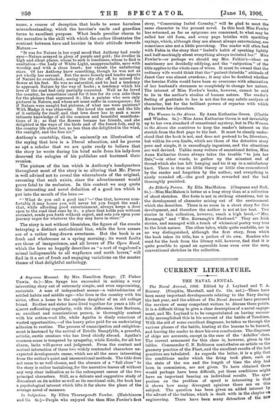story, "Concerning Isabel Carnaby," will be glad to meet the
same character in the present novel. In this book Miss Fowler has returned, as far as epigrams are concerned, to what may be called her old form, and every page bristles with sparkling sayings, which, although they are almost always entertaining, are sometimes also not a little provoking. The reader will often feel with Fabia in the story that " Isabers habit of speaking lightly and half-mockingly about everything always irritated her." Miss Fowler's—or perhaps we should say Mrs. Felkin's—ideas on matrimony are decidedly edifying, and the "subjection" of the title applies to the whole race of wives. It must be owned that the ordinary wife would think that the "patient Griselda" attitude of Janet Carr was almost overdone; it may also be doubted whether the heroine Fabia would have been so overcome with admiration of her husband's sternness as completely to change her nature. The interest of Miss Fowler's books, however, cannot be said to lie in the author's studies of human nature. The reader's feeling of gratitude to her is not due for any subtle analysis of character, but for the brilliant powers of repartee with which she invests her characters.










































 Previous page
Previous page